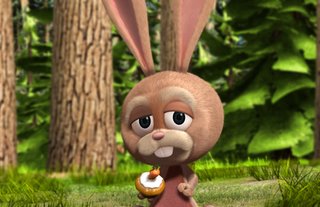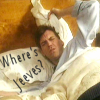It seems that queerness is continuing to need center stage in my blog.
I really enjoyed Hoodwinked. The plot is thin but cleverly structured, Patrick Warburton’s voice is always a pleasure, and it didn’t feel like a Pixar ripoff (though the squirrel was Scrat-like -- see 20th Century Fox’s Ice Age). Ok, Granny was predictable and ageist even as the writers were no doubt patting themselves on the back for their presumed anti-ageism in making her look like a fat, fluff-headed old grandma who is actually “GGG” the X-treme sports enthusiast.
But you could have knocked me down with a feather
 (boa), however, as Boingo the sissy bunny (complete with lisp) hopped his way through the movie and emerged in the end as the predictable-in-his-apparent-harmlessness villain. (Andy Dick’s voice made me think of Big Gay Al of South Park fame.)
(boa), however, as Boingo the sissy bunny (complete with lisp) hopped his way through the movie and emerged in the end as the predictable-in-his-apparent-harmlessness villain. (Andy Dick’s voice made me think of Big Gay Al of South Park fame.)If you know Hollywood history, you know of the Sissy, that staple of light, early film fare, including multiple characters played by Edward Everett Horton, Eric Blore, and the like. Whether he was the desexualized, ineffectual sidekick, the skittish, squeamish waiter, or the swishy, fussy clothing designer (or just a Cowardly Lion), the Sissy was a flat, stock character at/with whom we were meant to laugh. We easily read him as gay despite his lack of any sign of adult sexual drive because common “wisdom” held/holds that effeminate men are gay. Dandified and harmless, we could laugh safely at but not hate him. And while he might have made gay viewers feel less alone, it was not a positive reflection this Hollywood mirror offers.
Later, the Sissy would become evil, such as Peter Lorre’s Joel Cairo in The Maltese Falcon and, perhaps, The Lion King’s Scar, showing a change from early film tolerance (if you want to call it that) to a more virulent form of homophobia. Of course, representations don’t change in linear fashion. There are cycles and trends, exceptions and breakthroughs. From Don Knotts and Charles Nelson Reilly and Paul Lynde to Nathan Lane and Mr. Garrison and the Queer Eye guys, Hollywood has produced harmless Sissy men from the silent films to present-day television. The Sissy has even been given an empowered makeover, thanks to Harvey Fierstein and his Sissy Duckling (book and made-for-TV film). (And, while we're at it, I like Tomie DePaola's book Oliver Button is a Sissy, too.)
So that’s why it really freaked me out to see Boingo in Hoodwinked: why is the Sissy-cum-villain” back? Because Andy Dick’s fag voice is hip? Because it’s so incredibly clever that the seemingly feeble Sissy bunny is the criminal mastermind? Because it’s so incredibly clever that the seemingly feeble Sissy bunny is the criminal but no mastermind and is easily brought down, in need of Schwarzeneggerian muscled back-up, and even self-loathing enough to ridicule one of his henchmen, Keith, for his not-masculine-enough name?
Just what are we meant to be laughing at, and why? I had hoped to agree with the "A" Owen Glieberman gave the film in Entertainment Weekly -- and, dammit, I did enjoy the film. Moreover, I had hoped to have an afternoon off of blogging about homophobia. Is nowhere safe?


4 comments:
Why is the "sissy" back you ask. My own theory is that any time any minority group makes some head way against the status quo, some backlash is felt. Look at the movies of the forties and the strong, ennobled women in those roles. Not just the great Kate, but Bette, Barbara, Joan and Ginger. After the war, womens roles turned to film noir, and were evil and dangerous.Then we went to the Doris Day fluff where every woman wanted to get a man. African-Americans went from Steppin Fetchit to Shaft, to Sidney Poitier. As each group hits the mainstream demanding accetence that is their due, they must be laughed at, and demonized in turn. So, I think in that light, gays are making progress. But there is still a long way to go, even for the earlier mentioned groups. If you're different in any way from those that hold the reins, you have a shallow chance of being portrayed favorably. Or at the very least, "normal"
Hey Elyce Rae on the Radio!
Greetings from Andhra Pradesh, south India. Bush is coming here in a few weeks and we're organizing and expat protest. How the hell are you? I must catch up on your blog ASAP.
love, Caroline (yes that Caroline)
Omigod! Caroline (still Carolyn to me, or Kali), how wonderful to hear from you. Will hunt up your email soon and chat more. You look fabulous -- Namaste!
Um, he wasn't ridiculing the name (Kieth) as not masculine, it was ridiculed as not *scary*. Notice that one of the characters she was contrasting Keith with was, in fact, a woman, with a woman's name. You could have done the same with Kevin, Stewart or Brad. Just as Xena and her less-threatening sidekick Gabrielle wouldn't have worked with their names exchanged. Sounds a little like you were listening with a bias by that point. (And "Kieth" is unmasculine? Someone tell Kieth Richards.)
Post a Comment